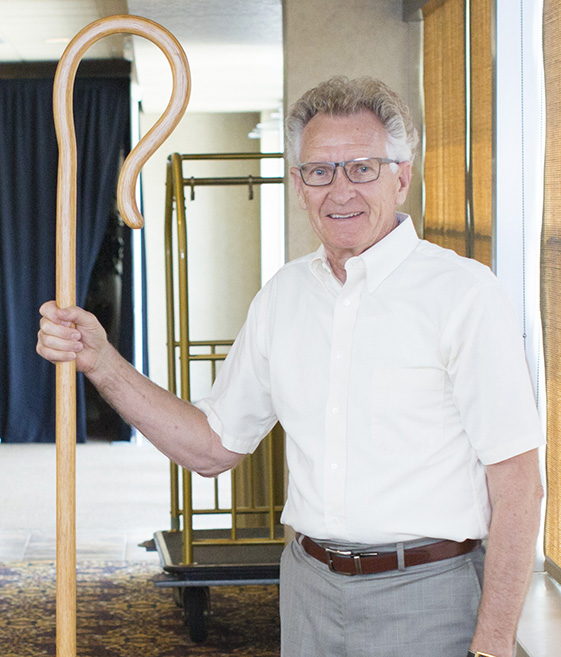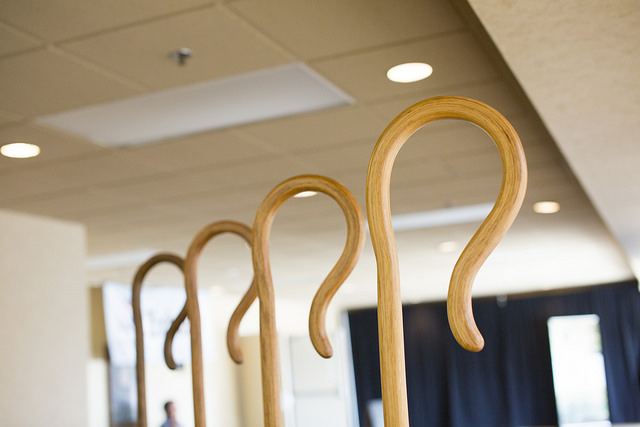
Scanson crafts crosiers for bishops
 BISMARCK--Rev. Art Scanson, a retired elder of the Dakotas Conference, has found a ministry in woodworking that is reaching bishops across The United Methodist Church. Scanson has handcrafted over 15 crosiers for bishops in the North Central Jurisdiction and for some bishops in other jurisdictions.
BISMARCK--Rev. Art Scanson, a retired elder of the Dakotas Conference, has found a ministry in woodworking that is reaching bishops across The United Methodist Church. Scanson has handcrafted over 15 crosiers for bishops in the North Central Jurisdiction and for some bishops in other jurisdictions.
Photo: Rev. Art Scanson poses with one of the crosiers he created for the newly elected bishops of the North Central Jurisction. Photo by jlynn studios.
“I have been making the crosiers for the North Central Jurisdiction since 2000. Every bishop that is elected in the North Central Jurisdiction receives one.” said Rev. Art Scanson, retired. “I have made a few for bishops in some other conferences as requested.”
This year Scanson created four crosiers for the newly elected bishops of the North Central Jurisdiction: Bishop David Bard, Michigan; Bishop Frank Beard, Illinois; Bishop Laurie Haller, Iowa; Bishop Tracy S. Malone, East Ohio.
The crosier is the symbol of the governing office of a bishop. In Western Christianity, the crosier (known as the pastoral staff, from the Latin pastor, shepherd) is shaped like a shepherd's crook. A bishop bears this staff as "shepherd of the flock of God". The crosier is often used when presiding at worship or church meetings.
Strips of oak are laminated together to form each crosier. “Fourteen strips of oak wood, 9 feet long, 4 inches wide are glued together to create the long handle or shaft,” said Scanson. He described that each layer has to be precisely placed and clamped into the jig within 30 minutes.
The hook is a little more involved. Smaller strips of wood, three inches long, are placed together like a web. One piece fits into another smaller piece in a jig to make the the actually hook.

Photo: Four crosiers that were crafted by Rev. Art Scanson and presented to the newly elected bishops of the North Central Jurisdiction: Bishop David Bard, Michigan; Bishop Frank Beard, Illinois; Bishop Laurie Haller, Iowa; Bishop Tracy S. Malone, East Ohio. Photo by jlynnstudios.
“It takes about 100 hours to make one crosier,” said Scanson. Each of the crosiers come with a base or stand. The base allows the crosier to stand straight wherever they are stationed. “I have learned a lot about how to make the corsiers over the years. At first I cut out the shape from a board. I now use the strips and lamination.”
Scanson sews a carrying case for each of the crosiers and also a case for each base. “The carrying case allows for easy travel for wherever the bishops want to use them, “ Scanson said.
Different colors of stain are applied to the wood to give each crosier a unique look. Every crosier has four coats of polyurethane.
“Woodworking has always been a hobby for me,” said Scanson. “It became part of my ministry when I was the pastor of a church in Leonard, N.D. They didn’t have a cross so I created one out of wood.”
Each bishop uses the crosiers in different ways. Some use them as décor in their office. Others use them at Annual Conference sessions as symbol of spiritual leadership at worship and during the business sessions.
“I will continue to do this as long as I am able and for as long as they ask,” said Scanson.